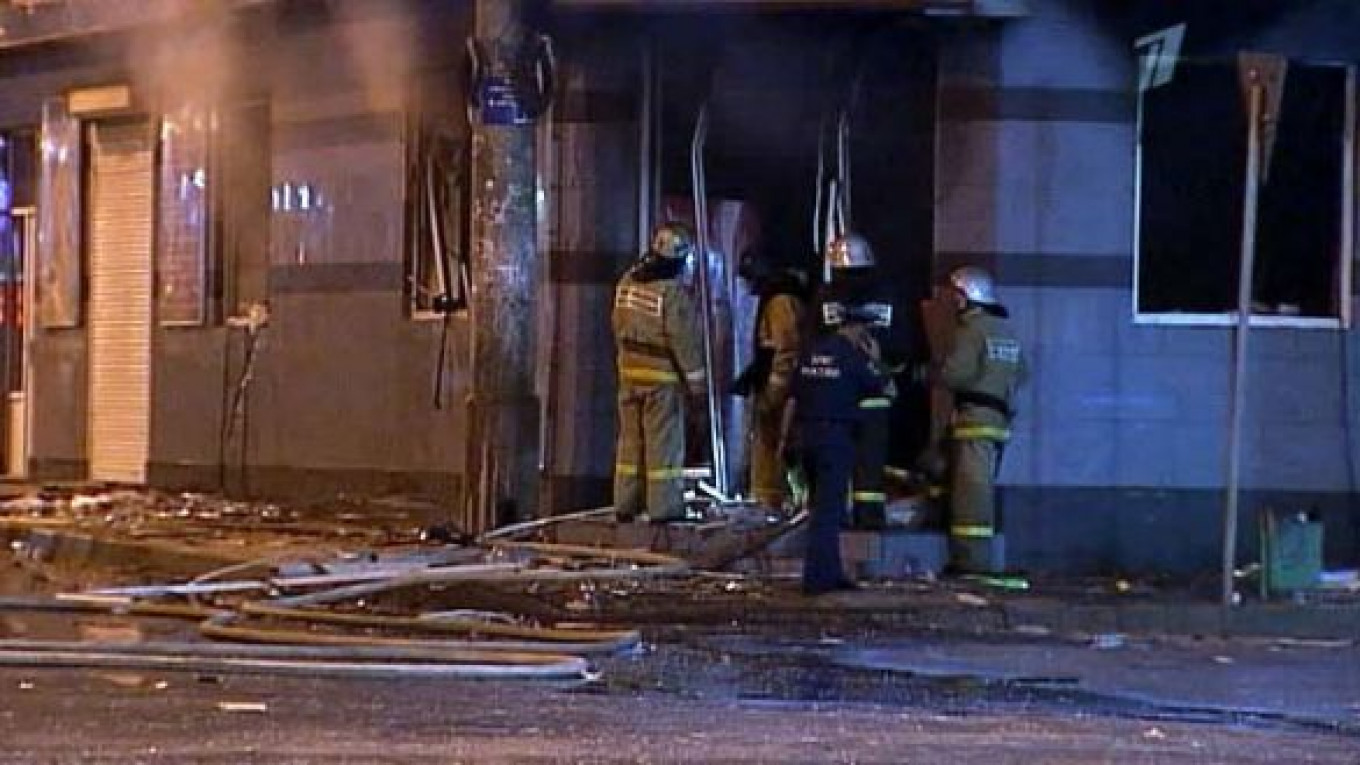Sixteen people have been injured in bomb blasts in Makhachkala after two stores were attacked for selling alcohol during the Muslim holiday of Ramadan.
One self-made bomb was planted in the "24 Hours" shop by two unidentified people, police said, while the other two, left at another store that sold various spirits, were left undetonated due to heavy rain.
The attacks came late Sunday at the end of a particularly violent 24 hours in Dagestan.
On Saturday night, two unidentified men opened fire on a vehicle in Makhachkala, killing one of the republic's moderate clerics, Ilyas Ilyasov.
And while it seems attacks against stores selling alcohol have been happening with less frequency than attacks against religious clerics, they have become routine in Russia's most violent region, underpinning an increased Islamic radicalization of the republic. Several such attacks were reported in 2011.
The Caucasian Knot news agency says that the attacks stem from sharia law but that religion is not the sole motivating factor: The attackers are getting revenge on store owners for their refusal to pay for permission to violate sharia law by selling alcohol. Thus, the situation mirrors the "protection" rackets that have been revealed elsewhere in Russia, albeit with a religious cover.
During Ramadan, devout Muslims are not allowed to consume food or drink liquids from dawn until sunset. Many Muslim countries, such as Saudi Arabia, Kuwait, Sudan, Iran, and Libya, prohibit the sale of alcohol throughout the entire year.
And though the North Caucasus is a far cry from those countries, the strict adherence to sharia law is rapidly becoming the norm there, even though a mere decade ago the situation in Dagestan and across the region was quite different, said Alexei Malashenko, scholar in residence at Carnegie Moscow Center.
"Last year, people would knock other people's drinks out of their hands if they were drinking in public, even if it was just kvass [a traditional Russian beverage made from black or rye bread that is lightly alcoholic]," he said. "People are afraid to drink today. You have to know where you can drink and whom you can drink with."
The process currently taking place in the North Caucasus is part of a broader shift toward the greater Islamization of many regions of the world, Malashenko said, with local authorities powerless to stop it.
Dagestan's new head, Ramazan Abdulatipov, appointed in January 2013, will likely face an uphill battle with radicalization.
In an apparent attempt to ease mounting tensions, Abdulatipov signed a law that bans the sale of alcohol during Ramadan, as well as from 8 p.m. until 10 a.m. throughout the year. But given Sunday's blasts, it is unclear whether the law has been effective.
"What we now have are typical Muslim enclaves within the territory of Russia," said Malashenko. "The new head, Abdulatipov, is a good and decent man, he wants stability, but he is powerless to stop the process of Islamization."
Contact the author at i.nechepurenko@imedia.ru
A Message from The Moscow Times:
Dear readers,
We are facing unprecedented challenges. Russia's Prosecutor General's Office has designated The Moscow Times as an "undesirable" organization, criminalizing our work and putting our staff at risk of prosecution. This follows our earlier unjust labeling as a "foreign agent."
These actions are direct attempts to silence independent journalism in Russia. The authorities claim our work "discredits the decisions of the Russian leadership." We see things differently: we strive to provide accurate, unbiased reporting on Russia.
We, the journalists of The Moscow Times, refuse to be silenced. But to continue our work, we need your help.
Your support, no matter how small, makes a world of difference. If you can, please support us monthly starting from just $2. It's quick to set up, and every contribution makes a significant impact.
By supporting The Moscow Times, you're defending open, independent journalism in the face of repression. Thank you for standing with us.
Remind me later.






